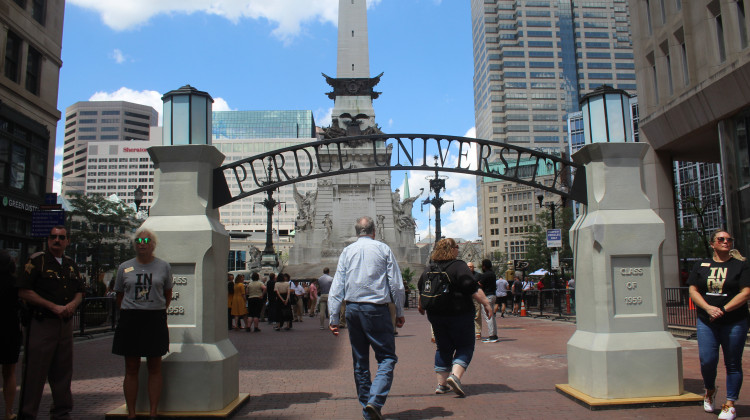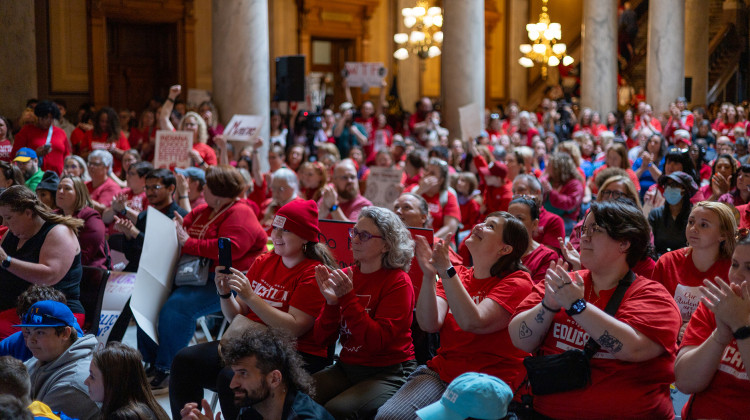
A group of Indiana University students are urging university staff to not share student citizenship information with U.S. Immigration and Customs Enforcement, regardless of their immigration status.
Peter Balonon-Rosen/IPBA group of Indiana University students are urging university staff to not share student citizenship information with U.S. Immigration and Customs Enforcement, regardless of their immigration status.
The move comes as President Donald Trump pledges to cut federal grants to “sanctuary cities” locales that don’t cooperate with immigration authorities. The student group, Undocuhoosier Alliance, would like to see Indiana University become a “sanctuary campus” and pledge its support to immigrant students who fear deportation.
“It is a commitment by the school to say that our law, our policy, is that we will protect [them] over federal law,” says Aaron Barati, executive member of Undocuhoosier. “[Immigration authorities] can do what ever they want to do, but we’re not going to help them.”
There are about 50 sanctuary campuses in the country, including Notre Dame. Undocuhoosier wants Indiana University to join the ranks, especially as Trump has pledged to end Deferred Action for Childhood Arrivals, or DACA, which temporarily shields students who were brought to the country illegally as children.
U.S. Department of Homeland Security data show more than 9,500 people living in Indiana are enrolled under the policy.
One of them agreed to be a source for this story if we didn’t use her real name, due to her immigration status. She says she didn’t know her immigration status until she was offered a college scholarship in the eight grade.
“I couldn’t apply for it because I didn’t have a social security card. And I didn’t realize what that meant until later,” she says. “Then I was like OK, so I’m different. I’m not like the rest of these kids and there’s not really a set plan for me. I didn’t know what I was going to do later.”
Today, she’s a biology major at Indiana University.
“I am an American, but I’m not the type of American you would think when you first think of American,” she says. “But our cultures make up what the United States is, which is a mix of a bunch of other cultures.”
Many undocumented immigrants make the country their home, they pay taxes, but do not apply for citizenship, because they fear they will be denied and deported.
After Trump won the election, student groups like Undocuhoosier asked universities to shield these students.
In a December meeting, roughly 50 staff members sat at long tables before about thirty students, who lined a wall of floor to celling windows. Provost Lauren Robel read an excerpt of a letter she wrote to seventeen students who disclosed their DACA status to her.
“I’m aware of the uncertainty about the continuation of this program raised during the recent presidential election. I know that uncertainty has caused anxiety for any students in the DACA program,” Robel said. “On behalf of the Bloomington campus let me assure you that we remain unwavering in our commitment to a welcoming, safe, and civil community for all of our students. ”
The students were not allowed to speak at the meeting, but many held signs that read “Keep your promise #sanctuarycampus.” Robel told the students the school will wait.
“I think it’s premature to speculate on what a future administration or Congress might do,” says Angela Adams, an attorney for Indiana University. “Until we see that, we don’t know. We really don’t know what will happen under the next administration. ”
Adams is also an Immigration lawyer and says a sanctuary campus has no legal meaning. But the undocumented student from earlier says, even so, its meaningful.
“There’s a lot of dehumanization and that goes with the stigma of just being an immigrant, and much more with being an undocumented immigrant,” she says. “That’s really hurtful and I really think that there should be more voices and more people that are stepping up, and making themselves be heard.”
Though IU is still waiting to see what the Trump administration will do, Undocuhoosier members say the university is working with them to admit undocumented students and connect them with financial resources.
 DONATE
DONATE





 View More Articles
View More Articles



 Support WFYI. We can't do it without you.
Support WFYI. We can't do it without you.